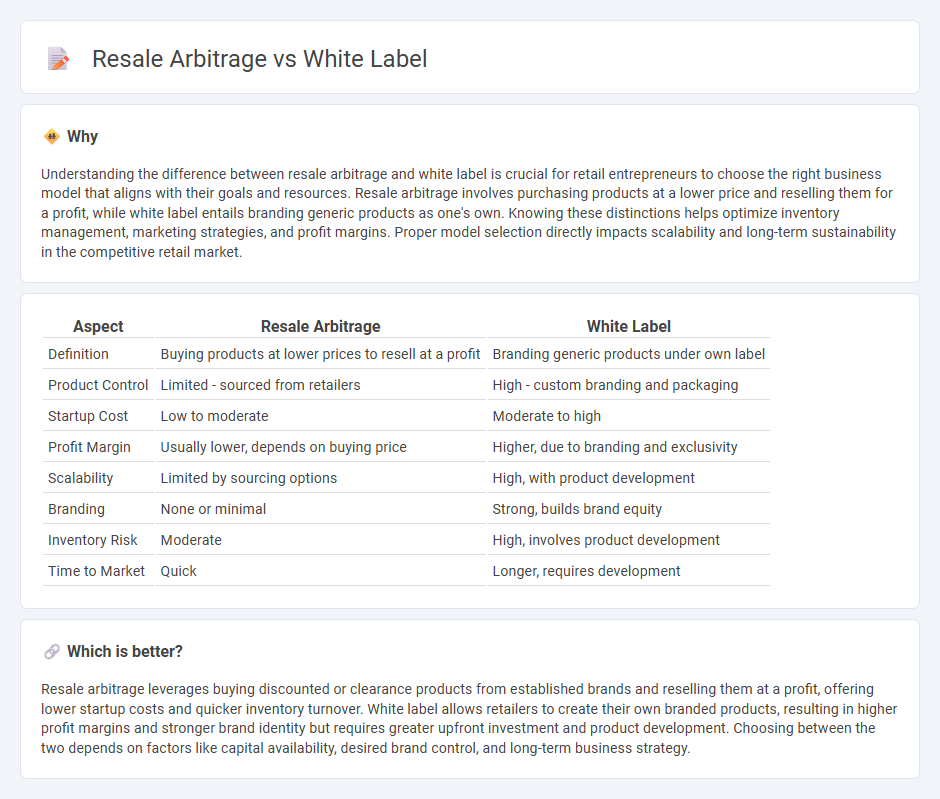
Resale arbitrage involves purchasing products from retailers at a lower price and reselling them for a profit, while white label refers to selling generic products under a custom brand name. Retailers using resale arbitrage capitalize on existing brand reputation, whereas white label sellers focus on building unique brand identity and product differentiation. Discover more about how these strategies impact retail success and profitability.
Why it is important
Understanding the difference between resale arbitrage and white label is crucial for retail entrepreneurs to choose the right business model that aligns with their goals and resources. Resale arbitrage involves purchasing products at a lower price and reselling them for a profit, while white label entails branding generic products as one's own. Knowing these distinctions helps optimize inventory management, marketing strategies, and profit margins. Proper model selection directly impacts scalability and long-term sustainability in the competitive retail market.
Comparison Table
| Aspect | Resale Arbitrage | White Label |
|---|---|---|
| Definition | Buying products at lower prices to resell at a profit | Branding generic products under own label |
| Product Control | Limited - sourced from retailers | High - custom branding and packaging |
| Startup Cost | Low to moderate | Moderate to high |
| Profit Margin | Usually lower, depends on buying price | Higher, due to branding and exclusivity |
| Scalability | Limited by sourcing options | High, with product development |
| Branding | None or minimal | Strong, builds brand equity |
| Inventory Risk | Moderate | High, involves product development |
| Time to Market | Quick | Longer, requires development |
Which is better?
Resale arbitrage leverages buying discounted or clearance products from established brands and reselling them at a profit, offering lower startup costs and quicker inventory turnover. White label allows retailers to create their own branded products, resulting in higher profit margins and stronger brand identity but requires greater upfront investment and product development. Choosing between the two depends on factors like capital availability, desired brand control, and long-term business strategy.
Connection
Resale arbitrage leverages the strategy of purchasing products at a lower price and selling them for profit, often using established brand names, while white label involves creating customized products sold under a retailer's own brand. Both methods capitalize on product sourcing and market demand but differ in brand control and product differentiation. Retailers use resale arbitrage to test market trends and white label to build brand loyalty through exclusive offerings.
Key Terms
Branding
White label products allow businesses to create a unique brand identity by customizing and rebranding goods produced by third parties, enhancing customer loyalty and differentiation. Resale arbitrage involves purchasing products at a lower price and reselling them without modification, which limits branding opportunities but can generate quick profits. Explore the key strategies to maximize brand impact and profitability in both models.
Supply Chain Control
White label products offer greater supply chain control by allowing businesses to customize manufacturing, packaging, and inventory management directly, ensuring consistent quality and branding. Resale arbitrage involves sourcing goods from existing retailers or wholesalers, often resulting in limited influence over product availability and delivery timelines. Explore our detailed comparison to understand which strategy best enhances your supply chain efficiency.
Profit Margins
White label products offer higher profit margins by allowing sellers to brand and price goods independently, whereas resale arbitrage relies on purchasing existing products at lower prices to resell at a markup, often resulting in thinner margins due to competition and fees. Sellers leveraging white label strategies benefit from greater control over product positioning and scalability, while resale arbitrage offers quicker entry with lower upfront costs but less margin stability. Explore detailed profit margin comparisons and strategic insights to maximize your ecommerce success.
Source and External Links
Understanding White Label Solutions for Business Expansion - White label refers to products or services produced by one company but rebranded and sold by another, allowing businesses to offer goods without developing them from scratch, commonly used across multiple industries including retail and technology.
What is White Labeling and How Does It Work? - Squarespace - White labeling involves manufacturers creating generic products that businesses then brand and market as their own, enabling quick expansion of product lines without manufacturing responsibility.
What Are White Label Products? (2025) - Shopify - White label products are generic items manufactured to be sold under different brand names, offering cost benefits and broader market reach without the need for extensive product development.
 dowidth.com
dowidth.com